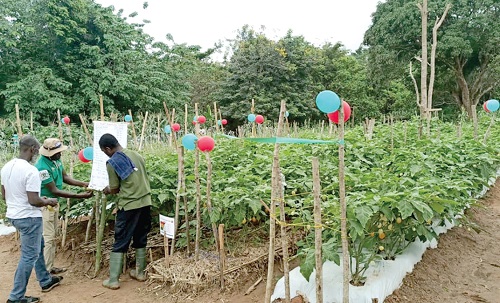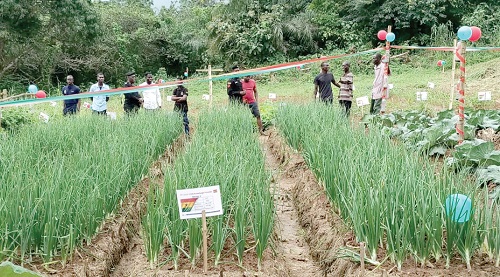
Boosting vegetable production: 10,000 Bono farmers to benefit from Abesim learning farm
The lack of access to improved seeds, particularly for vegetables, remains a huge challenge to some farmers in the Bono Region, one of the food baskets of the country.
Advertisement
Some farmers who contribute significantly to the country’s agriculture sector go through frustrations to access improved seeds, while others out of frustration plant any seed they can lay their hands on.
The situation has huge implications or threatens the country’s food security, nutrition, income of farmers and demotivates the youth who venture into agriculture.
Over the years successive governments and researchers have invested heavily to produce and make available more improved seeds for farmers to boost their production.
However, farmers, particularly in the region, are still struggling to have access to quality seeds, acquire techniques and technologies to enhance production and farming activities.
Crucial
It is a well-known fact that access to quality seeds and knowledge on how to grow crops play crucial roles in increasing agricultural production, supporting food security and improving living standards of farmers.
 Additionally, techniques and technologies are essential methods needed in the agriculture industry to boost yields and incomes of industry players.
Additionally, techniques and technologies are essential methods needed in the agriculture industry to boost yields and incomes of industry players.
However, some farmers in the country, especially smallholder farmers, depend on substandard seeds and the use of traditional methods and tools such as hoes and cutlasses to farm.
Sharing his frustrations on the acquisition of improved seeds, a 51-year-old vegetable farmer, Alex Kwasi Yeboah, told the Daily Graphic that the frustrations they sometimes went through to access quality seeds for planting was unbearable.
He said in some instances he had to travel to Kumasi or Accra to purchase improved cabbage, cucumber and onion seeds at a high cost for nursing.
Mr Yeboah, who has been in the vegetable industry for about 20 years, said sometimes he had to reduce production because of the lack and high cost of seeds from the market.
GDP
Despite the challenge, a Minister of State at the Ministry of Finance, Dr Mohammed Amin Adam, at the launch of a $69.7 million Affordable Agricultural Financing for Resilient Rural Development (AAFORD) project in Sunyani, said the agricultural sector accounted for 54 per cent of the country’s Gross Domestic Product (GDP).
He explained that the sector contributed 40 per cent of Ghana's export earnings, while providing over 90 per cent of the food needs of the country.
Dr Adam said a source from the Third Ghana Economic Update, 2020, put together by the World Bank showed that around 71 per cent of formal employment in rural areas was in the farming sector, indicating the importance of increasing agrarian incomes as a means of lowering rural poverty.
He said agribusiness had a very high multiplier effect on employment, creating over 750 jobs for every additional $ 1 million of output as indicated by the Ghana Economic Update, 2018, yet agricultural growth was affected by low productivity and competitiveness.
Statistics from the ministry clearly show that the sector could have performed better if farmers, including smallholder farmers, were empowered with the right seeds, guided to use best agriculture practices and introduced to agricultural technology.
Bridging the gap
In a bid to bridge the gap, the East-West Seed Knowledge Transfer Foundation in Ghana (EWS-KT), a non-profit organisation, in partnership with the East-West Seed, a vegetable seed company in Thailand, has established a learning farm at Abesim, near Sunyani in the Bono Region, to school and supply farmers with scarified seeds.

The learning site is also expected to introduce the farmers to practical knowledge on how to grow their crops and produce improved seeds for crops such as onion, cabbage, cucumber, tomato, hot pepper, eggplant and sweet corn among others.
The foundation has targeted to train 10,000 farmers, particularly smallholder farmers in 12 months in the region on how to produce quality seeds, in order to improve vegetable production and improve the living standard of the industry players.
Through its operation, the targeted beneficiary farmers will gain access to improved seeds while being given practical knowledge on how to grow their crops.
Low investment
The foundation seeks to support vegetable farmers to adopt modern techniques that require low investment to boost vegetable production in the country.
EWS-KT operates in other countries such as Bangladesh, Cambodia, India, Myanmar, Nigeria, Philippines, Tanzania and Uganda.
In November 2022, the foundation extended its operations into the country, where operations are starting from the Bono Region because it is one of the food baskets of the country.
The foundation said it had plans to increase its operation from the region to other regions in the next few years.
Pay attention
Speaking during the inaugural ceremony last Thursday, the Netherlands Ambassador to Ghana, Jeroen Verheul, advised the government to pay much attention to agriculture, as the sector remained the backbone of the country.
He stated the need for the country to increase its vegetable production, particularly onion and tomato, to be self-sufficient and urged the government to create an enabling environment for agriculture to flourish.
Mr Verheul explained that The Netherlands, one of the agricultural hubs of the world, was determined to partner the country to boost its vegetable production, in order to halt huge importation of vegetables.
Capacity development
For her part, the Knowledge Transfer Manager of the foundation in Ghana, Jemima Djah, said the EWS-KT, a commercial company with headquarters in Thailand and operating in more than 12 countries, including Ghana, was interested in the capacity development of smallholder farmers.
This, she said, would be done by coaching them to use best agriculture practices in order to improve their skills and livelihoods.
Mrs Djah said the foundation was poised to introduce smallholder farmers to improved agricultural techniques and technologies to increase their production and incomes.
She said the region was selected to benefit from the programme’s first operation in the country because it was one of the biggest food baskets of the country.
Appeal
The Sunyani Municipal Chief Executive, Ansu Kumi, called on The Netherlands government to partner with Ghana to boost its poultry industry.
He explained that the region was one of the biggest producers of poultry products and expressed the hope that the EWS-KT’s operation in the region would strengthen the vegetable value chain, increase local consumption and safe-to-eat vegetables.
Writer's email: [email protected]




